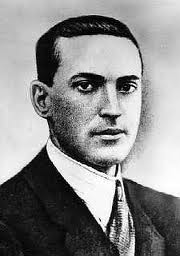Lev Vygotsky
Courtesy of The Vygotsky Project (http://webpages.charter.net/schmolze1/vygotsky/)
Reading Anderson’s (2009) article about Social Networking got me interested in digging deeper into his sources.
DIALECTICAL–MATERIALIST THEORY OF COGNITIVE DEVELOPMENT
I’ve seen Vygotsky before and have been curious about his theory. So I started to search in the UMUC library for Vygotsky’s Mind in Society. While UMUC library has this only as a physical book, I was able to find a number of interesting facts from the abstract. The first is that he was a Russian psychologist and the second is the name of his theory: dialectical–materialist theory of cognitive development (Vygotsky, 1978).
So I went back to searching again. Liu and Matthews (2005) confirmed other facts I found in the abstract: that Vygotsky sees an individual’s cognitive development as being formed by the social arena in which they live and that individuals collaboratively shape their world.
Then I switched gears and searched for dictionary definitions in an attempt to confirm what “dialectical–materialist theory of cognitive development” means. Dialectical-materialist is “the Marxist theory (adopted as the official philosophy of the Soviet communists) that political and historical events result from the conflict of social forces and are interpretable as a series of contradictions and their solutions. The conflict is seen as caused by material needs” (https://oxforddictionaries.com/definition/english/dialectical-materialism). A theory is “a supposition or a system of ideas intended to explain something” (http://oxforddictionaries.com/definition/english/theory?q=theory). Cognition is “the mental action or process of acquiring knowledge and understanding through thought, experience, and the senses” (http://oxforddictionaries.com/definition/english/cognition?q=cognition).
Vygotsky’s explanation could be said to be about mental process of acquiring knowledge through resolving the conflict of material needs in one’s social context.
REFERENCES
Anderson, T. (2009) Social Networking in Education. A draft paper to STRIDE handbook for The Indira Gandhi National Open University (IGNOU). Retrieved: April 27, 2009, from http://terrya.edublogs.org/2009/04/28/social-networking-chapter/
Liu, C., & Matthews, R. (2005). Vygotsky’s philosophy: Constructivism and its criticisms examined. International Education Journal, 6(3), 386-399. Retrieved from http://www.eric.ed.gov/PDFS/EJ854992.pdf
Vygotsky, L. (1978). Mind in society: The development of higher psychological processes. Cambridge: Harvard University Press.
